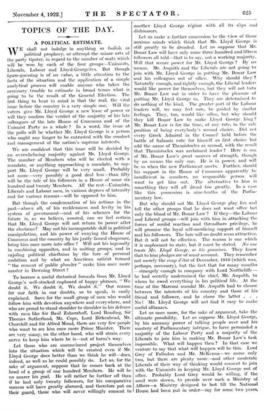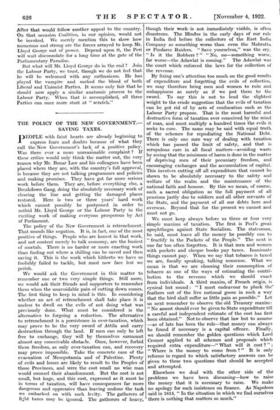TOPICS OF THE DAY,
A POLITICAL ESTIMATE.
WE shall not indulge in anything so foolish as political prophecy, or attempt the minor arts of the party tipster, in regard to the number of seats which will be won by each of the four groups—Unionists, Liberals, Labour and Lloyd-Georgcites. But though figure-guessing is of no value, a little attention to the facts of the situation and the application of a simple analytical process will enable anyone who takes the necessary trouble to estimate in broad terms what is going to be the result of the General Election. The first thing to bear in mind is that the real, the vital issue before the country is a very simple one. Will the voters give Mr. Lloyd George a new lease of power or will they confirm the verdict of the majority of his late colleagues of the late House of Commons and of the Unionist Party as a whole ? In a word, the issue at the polls will be whether Mr. Lloyd George is a person who ought any longer to be entrusted with the conduct and management of the nation's supreme interests.
We arc confident that this issue will be decided by an overwhelming majority against Mr. Lloyd George. The number of Members who will be elected with a mandate, or anything approaching a mandate, to sup- port Mr. Lloyd George will be very small. Probably not more—very possibly a good deal less—than fifty will be the talc of his followers in a House of some six hundred and twenty Members. All the rest—Unionists, Liberals and Labour men, in various degrees of intensity and for various reasons—will be opposed to him.
But though the condemnation of his actions in the past—above all, of his recklessness and levity in his system of government—and of his schemes for the future is, as we believe, assured, can we feel certain that Mr. Lloyd George will not return to power after the elections? May not his incomparable skill in political manipulation, and his power of swaying the House of Commons and the country by his justly famed eloquence, bring him once more into office ? Will not his ingenuity in combining opposites, and in uniting groups, and in cajoling political chieftains by the lure of personal ambition and by what an American satirist termed " the cement of public plunder " make him once more master in Downing Street ?
To borrow a useful rhetorical formula from Mr. Lloyd George's well-stocked cupboard of happy phrases, " We doubt it. We doubt it. We doubt it." Our reason for our faith in our doubts, so to speak, is easily explained. Save for the small group of men who would follow him with devotion anywhere and .everywhere, and who are proud to stand shoulder to shoulder in his defence with men like Sir Basil Zaharahoff, Lord Reading, Sir Thomas Sutherland, Mr. Cope, Lord Birkenhead, Mr. Churchill and Sir Alfred Mond, there arc very few people who want to see him once more Prime Minister. There are very many, on the other hand, who will strain every nerve to keep him where he is—out of harm's way.
Let those who are unconvinced project themselves into the situation which will be created even if Mr. Lloyd George does better than we think he will—does, indeed, as well as he could possibly do. Let -us, for the sake of argument, suppose that he comes back at the head of a group of one hundred Members. He will be no nearer his goal. He will rather be further off than if he had only twenty followers, for his comparative success will have greatly -alarmed, and- therefore put on their guard, those who will never willingly consent to another Lloyd George regime -with all its slips and dishonours.
Let us make a further concession to the view of those anxious minds which think that Mr. Lloyd George is still greatly to be dreaded. Let us suppose that Mr. Bonar Law will have only some three hundred and fifteen followers all told—that is to say, not a working majority. Will that secure power for Mr. Lloyd George ? By no means. Mr. Asquith and the Liberals arc not going to join with Mr. Lloyd George in putting Mr. Bonar Law and his colleagues out of office. Why should they ? Naturally enough, and rightly enough, the Liberal leaders would like power for themselves, but they will not turn Mr. Bonar Law out in order to have the pleasure of putting Mr. Lloyd George in. They are determined to do nothing of the kind. The greater part of the Labour leaders will, we may feel sure, be guided by similar feelings. They, too, would like office, but why should they kill Bonar Law to make Lloyd George king ?
Mr. Bonar Law is for the time, at any rate, in the safe position of being everybody's second choice. Did not every Greek Admiral in the Council held before the battle of Salamis vote for himself as first choice but add the name of Themistocles as second, with the result that Themistocles was acclaimed leader ? Here is one of Mr. Bonar Law's great sources of strength, though by no means the only one. He is in power, and will be so when the new Parliament meets. Further, should his support in the House of Commons apparently be insufficient in numbers, no responsible person will want to get him out. The alternative to him is something they will all dread too greatly. In a ease like this possession is nine-tenths of the Parlia- mentary law.
But why should not Mr. Lloyd George play fox and tell the other groups that he does not want office but only the blood of Mr. Bonar Law ? If they—the Labour and Liberal groups—will join with him in attacking the forces of sordid reaction and threadbare privilege, he will promise the loyal self-sacrificing support of himself and his followers. The lure will no doubt seem attractive. But it will not be effective. The reason is one which it is unpleasant to state, but it must be stated. No one trusts Mr. Lloyd George, or Ms promises. They know that to him pledges arc of scant account. They remember not merely the coup d'etat of December, 1916 (which was, perhaps, necessary), but the fact that for many months —strangely enough in company with Lord Northcliffe— lie had secretly undermined the chief, Mr. Asquith, to whom he owed everything in his political life. At the time of the Marconi scandal Mr. Asquith had to choose between the interests of his country and those of his friend and follower, and he chose the latter . . . No ! Mr. Lloyd George will not find it easy to make useful allianaes.
Let us once more, for the sake of argument, take the ultimate possibility. Let us suppose Mr. Lloyd George, by his uncanny power of talking people over and his mastery of Parliamentary intrigue, to have persuaded a majority of the Labour Party and a majority of the Liberals to join him in making Mr. Bonar Law's task impossible. What will happen then ? In that case we venture to say that what will happen will be this. Lord Grey of Fallodon and Mr. McKenna—we name only two, but there are plenty more—and other moderate Liberals of their way of thinking would consent to join with the Unionists in keeping Mr. Lloyd George out of office. Probably Lord Grey would be willing, if the need were shown, to preside over such a Ministry of Affairs—a Ministry designed to last till the National House had been put in order—say for some two years. After that would follow another appeal to the country. On that occasion Coalition, in our opinion, would not be invoked. We merely mention this to show how numerous and strong are the forces arrayed to keep Mr. Lloyd George out of power. Depend upon it, the Peri will wait disconsolate for a long time at the gate of the Parliamentary Paradise.
But what will Mr. Lloyd George do in the end ? Join the Labour Party, we trust, though we do not feel that he will be welcomed with any enthusiasm. He has played the vampire and sucked the blood of both Liberal and Unionist Parties. It seems only fair that he should now apply a similar anatomic process to the Labour Party. When that is accomplished, all three Parties can once more start at " scratch."







































 Previous page
Previous page